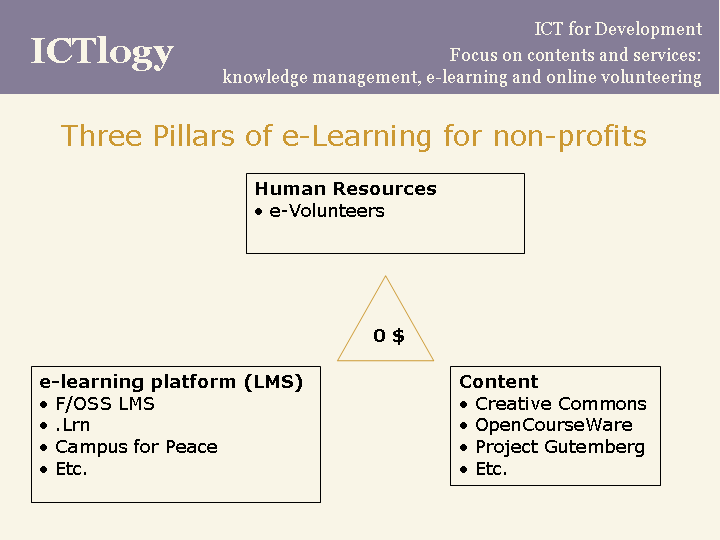ICTlogy, review of ICT4D, #10, July 2004
ICTlogy, review of ICT4D, #9, June 2004
e-Learning
- e-Learning for e-Inclusion
- Importance of deselecting media in elearning
- Virtual Educa
- Virtual Forum on Free and Open Source Software for E-Learning (revisited)
Free Software
Open Access
Online Volunteering
Wikiversity
Scott Leslie posts about the Wikiversity:
a free, open learning environment and research community. Online courses are being created as a form of co-operative and interactive exchange of knowledge
Some days ago Yan Simard and I had some interesting discussion about learning objects repositories vs. the power of the Internet by itself (enhanced by Google or other search engines) to act as a repository.
Well, I think the Wikiversity comes up to complicate things.
Simplifying quite a bit, I thing there are four kinds of free content (I wouldn’t call all of them learning objects) repositories:
- Learning objects repositories in the pure sense of the word, such as Careo or Maricopa’s MLX
- The Wikiversity, the Wikipedia and other wikis
- Open educational directories from education institutions, such as MIT OpenCourseWare or Berklee Shares
- The Internet itself + search engines
Forgive me for putting it that simple.
The question is that we’ve been talking and talking about folksonomies and it looks like what we make converge (categories) in one side we make it diverge the other side (repositories).
No, I don’t have any alternative, nor a clue. Just thinking out loud and sharing what I think is quite a big problem. At least, in the F/OSS field, even if there’s a huge diversity, you know that you have to be souceforged if you want to exist.
Sofia Open Content Initiative
The Sofia project is an open content initiative launched by the Foothill – De Anza Community College District with funding support from The William and Flora Hewlett Foundation. Under the leadership of Foothill College, Sofia promotes faculty and institutional sharing of online content. Modeled after MIT’s OpenCourseWare Initiative, Sofia encourages the free exchange of community college-level materials on the World Wide Web. It is our hope that Sofia will lead to the exploration of ways of supporting instruction and student learning using web-based resources.
[via EduResources Portal]
Three Pillars of e-Learning for nonprofits
This is something I talked about three months ago and then uploaded in my articles section an article about e-learning for nonprofits, based on F/OSS e-learning platforms, free (licensed) content and virtual volunteers. Unfortunately, at least for some of you ;), it was only in Spanish.
Still having to find the time to translate it, I did find the time to put it in a simple image.
The question is that, simplifying to the maximum, an e-learning course for nonprofits – and for whoever – can be done with three main pillars or pieces of the puzzle, and that these pieces can be at zero cost:
If you can’t read the image, the pieces are:
Human Resources
e-Volunteers
e-learning platform (LMS)
F/OSS LMS
.Lrn
Campus for Peace
Etc.
Content
Creative Commons
OpenCourseWare
Project Gutenberg
Etc.
Not very elaborated, but wasn’t I supposed to keep it simple? :P
OLS
[Via Sierto]
[Via autounfocus]
Based on MIT’s OpenCourseWare, Open Learning Support (OLS) provides “a space where individuals can connect to share, discuss, ask, answer, debate, collaborate, teach, and learn”.
I’ve sometimes said that MIT’s Intellectual Commons project lacked of a human contact: we’ve got content and technology but no feedback, no trainers at all.
Well, it looks like people at OLS (Utah State University) are filling the gap and are providing OpenCourseWare learning materials with an environment where learners can get in touch with experts and ask doubts, be provided with advice, etc. and experts can provide advice, and train (call it online volunteering ;)
I’m really hopeful seeing things like this. Bringing this to the underdevelopped countries is each time nearer! :)))


